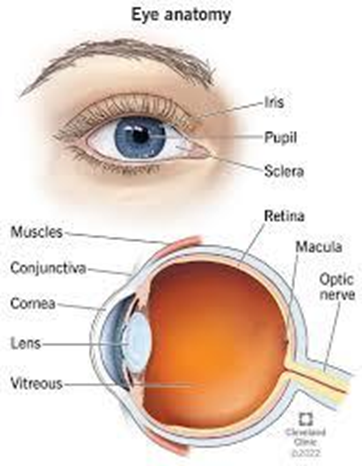Which of the following integral proteins allows ions to pass into or out of the cell?
Receptor
Channel
Ligand
Peripheral
The Correct Answer is B
a: Receptor - Receptors are proteins that bind to signaling molecules (ligands) outside the cell and initiate cellular responses but do not typically facilitate ion movement.
b. Channel-Integral membrane proteins called ion channels create pores in the cell membrane, allowing specific ions to pass through, thus facilitating ion movement into or out of the cell.
c: Ligand - Ligands are signaling molecules that bind to receptors, activating them, but they do not facilitate ion movement.
d: Peripheral - Peripheral proteins are found on the surface of the cell membrane but are not typically involved in creating ion channels
Nursing Test Bank
Naxlex Comprehensive Predictor Exams
Related Questions
Correct Answer is B
Explanation
a: Is the colored part of the eye - This describes the iris, which is the colored part of the eye that regulates the size of the pupil.
b. Located in the posterior cavity: The retina is a layer of tissue located in the posterior cavity of the eye. It contains photoreceptor cells that convert light into neural signals, which are then transmitted to the brain via the optic nerve.

c: Is the outermost layer of the eye - The outermost layer of the eye is the sclera, a tough, white layer that helps maintain the shape of the eye.
d: Produces aqueous humor - Aqueous humor is produced by the ciliary body and is found in the anterior chamber of the eye, not in the retina.
Correct Answer is B
Explanation
a: Decreased osmotic pressure - Decreased osmotic pressure would lead to fluid retention within the capillaries, not lymph production.
b. Increased hydrostatic pressure: Lymph is produced when there is an increase in hydrostatic pressure within the capillaries, which forces fluid and solutes out into the interstitial space, forming lymph.
c: Decreased hydrostatic pressure - Decreased hydrostatic pressure would result in decreased filtration of fluid from the capillaries, hindering lymph production.
d: Increased osmotic pressure - Increased osmotic pressure would draw fluid back into the capillaries, opposing lymph formation.
Whether you are a student looking to ace your exams or a practicing nurse seeking to enhance your expertise , our nursing education contents will empower you with the confidence and competence to make a difference in the lives of patients and become a respected leader in the healthcare field.
Visit Naxlex, invest in your future and unlock endless possibilities with our unparalleled nursing education contents today
Report Wrong Answer on the Current Question
Do you disagree with the answer? If yes, what is your expected answer? Explain.
Kindly be descriptive with the issue you are facing.
